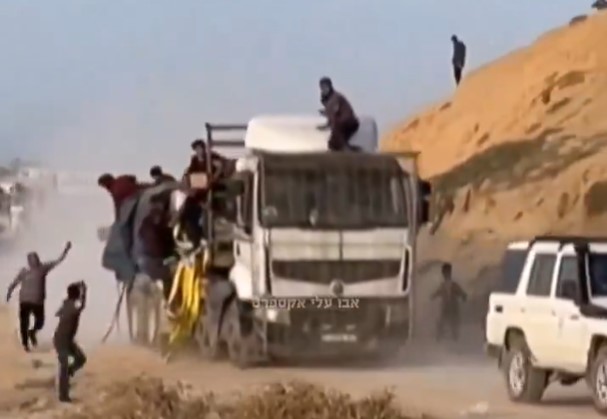The humanitarian situation in Gaza continues to escalate as United Nations agencies attempt to deliver aid amid violent resistance. Recently, the United Nations Relief and Works Agency (UNRWA) reported that a convoy consisting of 109 trucks carrying essential supplies was violently looted, leading to the loss of 97 trucks, with drivers coerced at gunpoint to unload their cargo. This alarming incident highlights the dire need for humanitarian assistance within Gaza, which is home to over 2 million people reliant on aid. While the UNRWA’s message addresses this urgent need, it also raises concerns regarding the attribution of blame for such violent acts, particularly in the context of ongoing tensions in the region.
Despite the gravity of the situation, the UNRWA’s post and subsequent media articles, particularly by The New York Times, have drawn attention to perceived culpability on Israel’s part. The UNRWA expressed concern that the Israeli authorities are neglecting their legal obligations under international law regarding the delivery of humanitarian aid and ensuring the welfare of the Gazan population. However, the agency fails to clarify that the looting occurred within Gaza itself, raising pertinent questions about the involvement of local actors, such as Hamas. This ambiguity can lead to misattributing responsibility and undermining the accountability of those directly involved in hindering aid distribution.
UNRWA spokesperson Louise Wateridge echoed the sentiment that the situation has become desperate, as individuals fight for limited supplies like flour. Her comments pointed to the broader context of Israeli restrictions that are seen as choking the humanitarian response. However, critics argue that linking Israeli restrictions to the looting of the convoy could be misleading when the immediate aggressors appear to be within Gaza’s borders. This situation raises significant concerns about the accountability of local authorities and armed groups operating in the region.
As reported incidents indicate that looters likely affiliated with Hamas played a role in the violent seizure of the aid convoy, questions arise regarding the UNRWA’s reluctance to explicitly identify Hamas as a responsible party. Social media discussions following the UNRWA’s announcement reflect frustration over this lack of clarity, with users pressing the agency to name Hamas as the primary actor in the looting incident. Such a call for accountability stresses the need for a balanced narrative that does not automatically default to blaming Israel for all miseries faced by Gazans, thereby potentially obscuring the actions of local power brokers.
Critics further contend that criticisms directed at Israel often fail to consider the complexities of the situation on the ground. Past actions taken by Israeli forces to prevent looting have themselves been misconstrued. For instance, there have been reports of Israeli soldiers firing at armed looters, which has led to accusations against Israel by the UNRWA. It raises the question of how reasonable it is to expect a military response to a chaotic situation involving violent looters, particularly in an environment where Israel is simultaneously portrayed as the oppressor.
While the plight of individuals in Gaza certainly warrants attention and immediate action, clarity regarding accountability is essential in any discourse surrounding humanitarian efforts. For aid to be effectively delivered and reach those who truly need assistance, local governance and armed groups in Gaza must take responsibility for securing convoys against theft and violence. Without acknowledging the roles of groups such as Hamas, discussions surrounding aid distribution remain incomplete, neglecting vital elements that contribute to the ongoing turmoil in the region.

